关于竞争是有益的_英语作文
- 格式:docx
- 大小:15.98 KB
- 文档页数:1
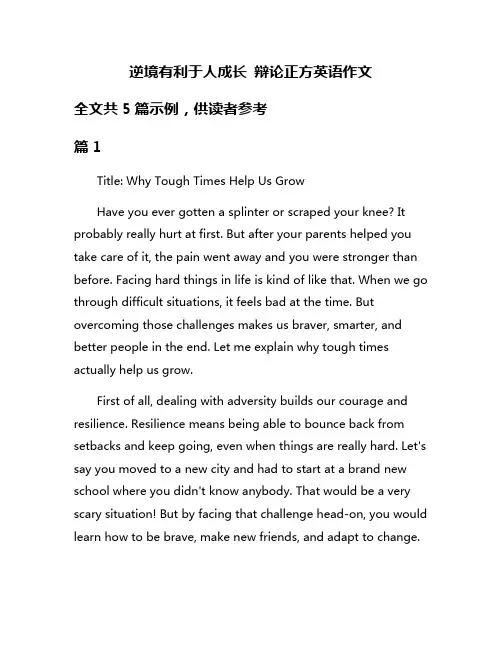
逆境有利于人成长辩论正方英语作文全文共5篇示例,供读者参考篇1Title: Why Tough Times Help Us GrowHave you ever gotten a splinter or scraped your knee? It probably really hurt at first. But after your parents helped you take care of it, the pain went away and you were stronger than before. Facing hard things in life is kind of like that. When we go through difficult situations, it feels bad at the time. But overcoming those challenges makes us braver, smarter, and better people in the end. Let me explain why tough times actually help us grow.First of all, dealing with adversity builds our courage and resilience. Resilience means being able to bounce back from setbacks and keep going, even when things are really hard. Let's say you moved to a new city and had to start at a brand new school where you didn't know anybody. That would be a very scary situation! But by facing that challenge head-on, you would learn how to be brave, make new friends, and adapt to change.The more obstacles you overcome, the more resilient you become.Another way adversity helps us grow is by teaching important life lessons. Imagine you got a bad grade on a math test because you didn't study very hard. That's a tough situation, but it teaches you that you need to work hard and be responsible to get good results. Or let's say you hurt a friend's feelings by saying something unkind. As painful as that situation is, you learn how your words can impact others and why it's important to be caring. Every challenge provides an opportunity to gain wisdom.Difficult times also inspire creativity and problem-solving skills. Think about if you really, really wanted a new bike but your parents couldn't afford it. To get that bike, you would have to think outside the box. Maybe you could do extra chores to earn money. Or you could ask neighbors if you could do yardwork for them. Facing that adversity pushes you to come up with creative solutions you never considered before.Furthermore, overcoming challenges builds unbreakable self-confidence. Let's say you used to be terrified of the high dive at your neighborhood pool. But after lots of practice and courage, you finally learned how to dive off the high board. Justthink how incredibly proud and self-assured you would feel after that! When you achieve things you didn't think were possible, it proves to yourself that you are strong and capable of anything.Lastly, persevering through tough times brings people closer together. If your family was going through financial problems, you would all have to make sacrifices and support each other. Or if one of your family members was very sick, everyone would unite to take care of them. Sharing those kinds of hardships creates powerful bonds that bring people together for life.Some people might argue that facing adversity is too stressful, scary, or difficult - especially for kids. But overcoming challenges is how we learn, grow stronger, and become our best selves. All the successful people you admire had to conquer their own obstacles before achieving greatness. Michael Jordan had to persevere through being cut from his high school basketball team. J.K. Rowling pushed through depression and poverty before writing Harry Potter. If they had given up during adversity, the world would have missed out on their amazing talents.So next time you face a tough situation, remember - that adversity is an opportunity! It's a chance to practice perseverance, gain wisdom, think creatively, feel proud of yourself, and grow closer to others. No one said life would beeasy, but developing inner strength is how we all become strong, brilliant, caring people. Embrace those challenges, and use them to help you blossom into your most awesome self!篇2Adversity Helps Us GrowHi friends! Today I want to talk about how going through hard times can actually be good for us. I know it doesn't seem that way when you're in the middle of struggles and challenges. Believe me, I've had my fair share of tough stuff too! But if we look at the bigger picture, facing adversity ends up making us stronger and better people in the long run.Let me give you some examples from my own life. A few years ago, my family moved to a brand new city because my dad got a different job. I was really sad to leave behind all my friends and the only home I had ever known. Everything was so unfamiliar and scary in our new town. I missed my old school, my old house, my old neighborhood. For a while, I felt really alone and upset about the whole situation.But you know what? That difficult experience of having to start over ended up being an amazing opportunity for growth. Because I was thrust into a totally new environment, I had tolearn how to make new friends and get myself out of my comfort zone. I became more outgoing, confident and independent. If we had never moved, I would have stayed in my little comfortable bubble and never developed those critical social skills.Another hard thing I went through was failing my math test in 3rd grade. I had studied really hard, but just froze up during the test and bombed it. I felt like such a failure and dummy. My parents had to come in for a meeting with my teacher and everything. It was embarrassing and discouraging. But my wonderful teacher, Mrs. Robertson, didn't let me stay down on myself. She said "Shannon, this is a opportunity to learn how to deal with setbacks. Failure happens to everyone, but it's how you respond that matters."Mrs. Robertson gave me a second chance to prove myself, and I worked twice as hard to master those math concepts. I started going to her for extra help during lunch, doing extra practice problems at night, and figuring out test-taking strategies. When I re-took the test a few weeks later, I got an A+! From that experience, I learned the value of perseverance, hard work, and picking yourself up after disappointment. Those are skills that will help me the rest of my life when faced with future obstacles.I could go on with more examples, like dealing with my parents' divorce or recovering from a broken arm. While none of those things were fun or easy in the moment, they all forced me to develop resilience, courage, patience and other positive qualities that continue to serve me well.When you think about it, we don't really grow or gain wisdom from the good times or easy victories. Those just kind of breeze on by without much effort on our part. It's only when we have to struggle, problem-solve, and overcome real hardship that the tough lessons get imprinted. That's when we build our "muscle" for perseverance and resilience, gain confidence from achieving hard-won successes, and develop compassion from having been through dark spaces ourselves.Some of the most inspiring people in history - like Helen Keller, Nelson Mandela, Malala Yousafzai - dealt with immense adversity and injustice. But rather than letting it defeat them, they used it as fuel to become stronger, wiser, and more determined to make a difference in the world. If they had led a life of ease and comfort, they may never have found that inner fire and resolve that made them so influential.Of course, this isn't to say we should go around looking for problems or hardship. Difficult times will inevitably find us,without us having to seek them out! But when adversity strikes, as it does for everyone at some point, we can choose to either resist it and let it harden us...or we can embrace it as an opportunity to stretch ourselves and evolve into better versions of who we are.I know dealing with hard stuff is never fun in the moment. Trust me, there were times I was in tears over problems I was facing, feeling like I couldn't go on. But when I look back at the obstacles I've overcome, I realize they gave me priceless lessons and inner fortitude. I'm deeply grateful for the struggles that helped shape me into a more resilient, mature, and compassionate person.Without experiencing a little pain and hardship, you don't fully appreciate the good times. The tough times also help give you perspective and show you how fortunate you truly are, even in your regular daily life. While I certainly don't go looking for more trouble, I now accept that adversity is inevitable and have an attitude of "Bring it on! This too shall make me stronger."So to all my friends out there going through your own tough stuff right now - whether it's troubles at school, dealing with parents' expectations, friend drama, or any other kiddo problems - just know that your struggles and growing pains right now aresetting you up for success and growth. It might not feel like it, but years down the road you'll look back and be grateful for how those challenges shaped you into the resilient, persevering person you've become.Stay strong, face those obstacles head-on, and have faith that like none other, adversity itself is one of the greatest teachers in helping you reach your awesome life potential!篇3Adversity is Actually Good for You!Hi there! My name is Jamie and I'm a 5th grader. Today I'm going to tell you all about why going through tough times and dealing with problems can actually help you grow up to be a stronger, better person. It might sound crazy at first, but just hear me out!When we're little kids, things are pretty easy. Our parents take care of us and we don't have to worry about much besides playing and having fun. But as we get older, life starts throwing us curveballs. Maybe you fail a big test at school or you get in an argument with your best friend. Or even bigger stuff like if one of your parents loses their job or someone in your family gets sick.Those kinds of situations are no fun at all! They can make us feel sad, scared, worried, or just plain stressed out. In the moment, adversity feels terrible. But here's the thing - overcoming those challenges is how we build important life skills. It's like leveling up in a video game. Yeah, you might die a few times while fighting the boss. But once you beat it, you earn way more experience points and get stronger for the next level.Let me give you some examples of how dealing with adversity when you're a kid pays off as you get older:One of the biggest things it teaches you is resilience. That's about being able to bounce back from failures or disappointments instead of just giving up. Let's say you tried your best studying for your math test but still ended up with a bad grade. You could just say "I'm bad at math, oh well" and quit. Or, you could be resilient - use that setback as motivation to work even harder, get tutoring, try different study strategies, and do better next time. Having resilience will help you tremendously in pretty much every area of life!Adversity also helps build crucial problem-solving skills. When you face an obstacle, you can't just freeze up. You have to get creative and figure out a solution. For instance, say your best friend stopped talking to you and you have no idea why. Youcould make the problem worse by getting angry and giving them the silent treatment too. Or, you could act like a problem-solver - swallow your pride, ask them what's wrong, listen to understand their perspective, and find a way to make amends. Practicing this whenever you've got an issue in your life will make you into an awesome problem-solver as an adult.Going through hard things gives you important lessons in perseverance too. That means powering through and not giving up, even when you reeeally want to quit. Like if you sign up for a tough extracurricular like hockey or ballet. There will be times when it's freezing cold at practice, you're exhausted, and you just want to be home playing video games instead. But sticking with it and persevering is how you get good at stuff! All the skills and work you need to get into college or start a career require a whole lot of perseverance.Another big one is building emotional intelligence. When we first face adversity, a lot of us just feel negative emotions like anger, sadness, or frustration. That's natural! But as we get more experience, we start learning how to process those feelings in a more mature way. We can stop ourselves from just lashing out, and use techniques like taking deep breaths, reframing things positively, or talking it through with others. Having highemotional intelligence helps a ton with things like leadership, teamwork, and even personal relationships as an adult.Struggling with difficulties can also teach you self-reliance - being able to depend on yourself instead of always relying on others. For example, say your parents get divorced and you have to take on more chores and responsibilities around the house. As unpleasant as that is in the moment, it builds your self-reliance skills for the future when you'll need to do your own laundry, cook meals, manage your money responsibly, and so on.And one final big one - overcoming adversities often gives you a greater appreciation for the good things in your life. Let's say your family loses your home in a fire or other disaster. Going through that traumatic event and recovery makes you cherish having a roof over your head so much more later on. You don't take things for granted as easily. Getting through really hard times can put things in perspective in a way that leaves you feeling more humble and grateful.Of course, that doesn't mean someone should go looking for bad things to happen! Adversity is never fun. And there are some traumatic events and difficulties that are too much for kids to have to deal with. But quite a few of the everyday struggles, failures, and obstacles we all face when we're young? As much asthey might stink in the moment, they're actually opportunities to grow.Think of it like exercise. When you workout, you're putting your muscles through some short-term stress and strain. It's hard and maybe even painful at times. But that's exactlywhat makes you stronger in the long run. The same goes for building your character, resilience, grit,problem-solving, and other mental and emotional skills. A surprisingly big level-up in life comes from working through adverse situations and not taking the easy way out.So next time you're facing a challenge or setback, try to have a positive mindset. This is your chance to get mentally tougher! What is this adversity going to teach me? How can I use it as an opportunity to grow? Don't let it keep you stuck - use it as motivation to level up and become a stronger, wiser, more capable version of yourself. That's the awesome thing about adversity when you're young. Dealing with it is hard, but overcoming it is what equips you with the tools to live your best life as an adult!篇4Sure, here's an essay arguing for the affirmative side of the debate "Adversity is beneficial for personal growth" written in English with a tone suitable for elementary school students, at around 2,000 words:Title: Why Tough Times Make Us StrongerHave you ever felt really sad or worried because something bad happened? Maybe you failed a test, or got into a fight with your best friend. When difficult things happen, it can feel like the whole world is against us. But you know what? Going through hard times can actually help us grow and become better people!Let me tell you a story about my friend Tommy. Tommy was the star player on our school's basketball team. He was the best shooter and could make crazy basketball tricks look easy. Tommy loved basketball more than anything else in the world.One day, during an important game, Tommy went up for a shot and landed wrong on his foot. He heard a crack and fell to the ground in pain. Poor Tommy had broken his ankle really badly. The doctor said he wouldn't be able to play basketball for at least six months while his ankle healed.Tommy was absolutely heartbroken. Basketball was his whole life, and now he couldn't play at all. For weeks, he wasreally sad and grumpy. He didn't want to hang out with friends or even watch basketball games on TV because it made him too upset.But eventually, Tommy realized that feeling sorry for himself wasn't helping anyone, especially himself. He decided to take up painting to have something else to focus on besides basketball. At first, his paintings weren't very good. But Tommy kept practicing every day, watching online tutorials and asking the art teacher for help.After a few months of hard work, Tommy's paintings started getting really good! He found that he loved expressing himself through art, mixing beautiful colors, and creating new scenes. Painting also helped Tommy stay patient and positive while waiting for his ankle to fully heal.When Tommy was finally able to play basketball again half a year later, he was more determined than ever before. He had gained resilience and mental toughness from getting through such a difficult experience. Plus, with his new creative outlook from painting, he started trying fun, innovative moves on the court that wowed his teammates.Tommy's story shows that going through adversity, or hard times, can make us stronger people in the end. Here are three reasons why tough situations can actually be good for us:Adversity builds resilience. When we overcome challenges, it proves to ourselves that we're tougher than we thought. Next time something difficult happens, we're better prepared to get through it. Just like how lifting heavy weights makes our muscles stronger, overcoming adversity makes our minds and spirits stronger too.Struggling helps us find inner strength. When nothing is going wrong in our lives, it's easy to coast by without giving much effort. But when we're faced with problems, we're forced to dig deeper and find the determination to keep going. Tough times push us to use strength and courage we may not have realized we had.Adversity leads to personal growth. Going through hard situations stretches our abilities and develops new skills. If Tommy had never broken his ankle, he may have never discovered his talent and passion for painting. When we make it through difficulties, we end up wiser and more capable than before.Of course, this doesn't mean we should go looking for problems! Dealing with adversity is never easy or fun. But when it does happen, instead of saying "Why me?", we can choose to say "This is an opportunity to grow and become stronger."So the next time you're facing a really tough situation, don't feel defeated. Have courage and keep pushing forward. The challenges you overcome are shaping you into an even better version of yourself. Adversity builds character and turns ordinary people into true champions!篇5Adversity Makes You Grow UpHi everyone! My name is Jamie and I'm 10 years old. Today I'm going to tell you all about how dealing with hard times and challenges can actually be really good for kids like me. It might seem weird to say problems are good, but hear me out!First of all, when life gets tough, it forces you to become more mature and independent. Like when my dad lost his job last year, that was really scary and stressful for my whole family. We had to cut way back on expenses, which meant no more eating out, new toys, or fun vacations for a while. Instead of my parents just handling everything, I had to start doing morechores around the house to help out. At first I hated having to do extra work, but after a little while I realized it was making me more responsible and capable of taking care of myself. Now I don't even mind doing chores most of the time!My parents were also a lot more anxious and upset during those months, so I couldn't just go running to them about every little issue anymore. I had to start solving some of my own problems, like fixing snacks for myself when I was hungry or sorting out disagreements with my little brother on my own. That made me much more self-reliant instead of always depending on my parents to swoop in and fix everything. I've grown up a lot because of having to deal with that temporary family hardship.Another way adversity helps kids mature is that it teaches you to have empathy for others going through difficult situations. Before my dad got laid off, I never really understood what it felt like for people to struggle with not having enough money or uncertain futures. But living through that rough patch myself showed me how scary and stressful it can be. Now I have way more compassion for families who don't have as much or are having a hard time. I don't take things for granted as much anymore.Overcoming obstacles and adversity also builds important life skills that will help you be successful when you're older. Like maybe your family is going through financial problems or your parents are getting divorced or someone close to you is really sick. Having to cope with crazy hardship forces you to get really good at things like:Problem solving and thinking critically to find good solutionsManaging your emotions and anxieties in a healthy wayBeing resilient and persistent instead of just giving upLearning to adapt to sudden changes and unpredictable situationsBecoming an excellent planner and prioritizing what's truly importantTaking responsbility for yourself and not making excusesAll of those skills are super crucial for fulfulling your goals later in life, whether it's getting into a great college, having a successful career, or just being a happy, productive adult. The earlier you can start developing those abilities, the better off you'll be!I know going through adversity might seem terrible when you're actually in the middle of it. Dealing with serious issues or trauma is no fun at all. But think of it like excerise - nobody loves actually doing it, but afterwards you feel so much stronger, more accomplished, and better about yourself. That's exactly how overcoming hardship can make you feel deep down. It stinks in the moment, but it makes you so much braver, wiser, and more grown up in the end. What could be better than that?Plus, if you never had to face any hard times or obstacles in your life, you wouldn't build up those essential skills for success. You'd just stay weak, unmotivated, and unable to cope when things inevitably did go wrong eventually. By experiencing some adversity when you're young, you get strong life muscles to carry you through any future challenges down the road. Just like my gym teacher is always saying - no pain, no gain!So even though it's no fun going through turmoil and tough times, try to have a positive mindset about it. Don't just feel sorry for yourself - embrace the opportunity to grow stronger, wiser, and more resilient. You're getting prepared to achieve great things! So keep persisting, work harder than ever to push through it, and you'll come out younger and better in the long run.Dealing with adversity is how kids like me get to level up into becoming unstoppable comeback kids. We transform our struggles into strength! So bring it on, life - we can handle anything you throw our way. The harder it gets, the more we'll keep growing and growing. Thanks for listening, everyone! Now I've got to go make myself a snack and do my chores, but remember: adversity makes you grow up!。
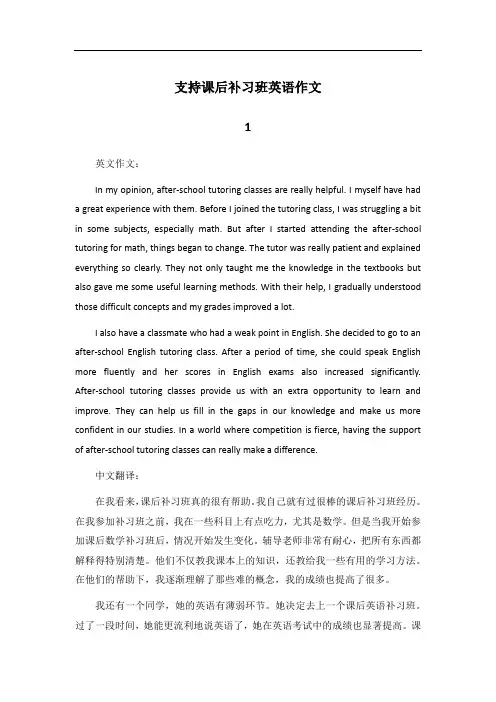
支持课后补习班英语作文1英文作文:In my opinion, after-school tutoring classes are really helpful. I myself have had a great experience with them. Before I joined the tutoring class, I was struggling a bit in some subjects, especially math. But after I started attending the after-school tutoring for math, things began to change. The tutor was really patient and explained everything so clearly. They not only taught me the knowledge in the textbooks but also gave me some useful learning methods. With their help, I gradually understood those difficult concepts and my grades improved a lot.I also have a classmate who had a weak point in English. She decided to go to an after-school English tutoring class. After a period of time, she could speak English more fluently and her scores in English exams also increased significantly. After-school tutoring classes provide us with an extra opportunity to learn and improve. They can help us fill in the gaps in our knowledge and make us more confident in our studies. In a world where competition is fierce, having the support of after-school tutoring classes can really make a difference.中文翻译:在我看来,课后补习班真的很有帮助。
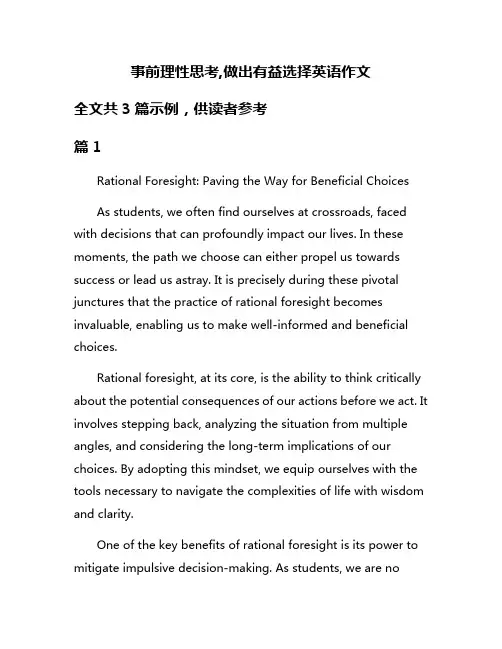
事前理性思考,做出有益选择英语作文全文共3篇示例,供读者参考篇1Rational Foresight: Paving the Way for Beneficial ChoicesAs students, we often find ourselves at crossroads, faced with decisions that can profoundly impact our lives. In these moments, the path we choose can either propel us towards success or lead us astray. It is precisely during these pivotal junctures that the practice of rational foresight becomes invaluable, enabling us to make well-informed and beneficial choices.Rational foresight, at its core, is the ability to think critically about the potential consequences of our actions before we act. It involves stepping back, analyzing the situation from multiple angles, and considering the long-term implications of our choices. By adopting this mindset, we equip ourselves with the tools necessary to navigate the complexities of life with wisdom and clarity.One of the key benefits of rational foresight is its power to mitigate impulsive decision-making. As students, we are nostrangers to the allure of instant gratification – staying up late binge-watching our favorite shows, indulging in unhealthy snacks, or procrastinating on assignments. However, these momentary pleasures often come at the cost of our long-term well-being and academic success. Rational foresight enables us to pause, reflect on the potential ramifications of our actions, and make choices that align with our ultimate goals.Furthermore, rational foresight fosters a growth mindset, allowing us to view challenges as opportunities for learning and self-improvement. When faced with academic difficulties or setbacks, it is tempting to succumb to feelings of frustration and hopelessness. However, by exercising rational foresight, we can reframe these obstacles as stepping stones towards personal growth. We can analyze the root causes of our struggles, identify areas for improvement, and develop strategies to overcome them, ultimately emerging stronger and more resilient.In addition to academic pursuits, rational foresight plays a crucial role in shaping our personal and social lives. As we navigate the intricate web of interpersonal relationships, it is essential to consider the potential impacts of our actions on others. By employing rational foresight, we can cultivate empathy, understand different perspectives, and make choicesthat foster positive connections and promote harmony within our communities.Moreover, rational foresight is an invaluable asset in preparing for the future. As we approach pivotal life decisions, such as choosing a career path or determining our long-term goals, rational foresight enables us to envision the potential outcomes of our choices. We can explore various scenarios, weigh the pros and cons, and make informed decisions that align with our values and aspirations.Developing the skill of rational foresight, however, is a continuous journey that requires dedication and practice. It involves actively cultivating critical thinking, seeking diverse perspectives, and remaining open to new information. Engaging in thought experiments, discussing hypothetical scenarios with peers, and seeking guidance from mentors and advisors can all contribute to strengthening our ability to think rationally and foresee potential consequences.It is important to acknowledge that rational foresight is not a panacea for life's uncertainties. There will always be unforeseen circumstances and unpredictable events that challenge our best-laid plans. However, by embracing rational foresight, weequip ourselves with the tools to navigate these uncertainties with greater resilience and adaptability.As students, the choices we make today will undoubtedly shape our future trajectories. By cultivating rational foresight, we empower ourselves to make decisions that are not only beneficial in the present but also align with our long-term aspirations. It is a skill that transcends academic pursuits, enabling us to navigate personal relationships, contribute positively to our communities, and ultimately, lead fulfilling and purposeful lives.In a world that often prioritizes instant gratification and short-term gains, rational foresight stands as a beacon, guiding us towards a path of intentional living and well-informed decision-making. Embrace this mindset, and you will find yourselves equipped to make choices that not only benefit you but also contribute to the greater good of those around you.篇2Thinking Rationally in Advance to Make Beneficial ChoicesAs students, we are constantly faced with choices and decisions that can have a significant impact on our lives and futures. From choosing what classes to take and extracurricularactivities to pursue, to deciding on a major and career path, the decisions we make today can shape our trajectories for years to come. It's crucial, therefore, that we approach these choices with a rational and thoughtful mindset, considering not only our immediate desires but also the long-term consequences and potential benefits of our actions.One of the most important aspects of making beneficial choices is the ability to think rationally in advance. This means taking the time to carefully consider all the available options, weighing the pros and cons, and projecting potential outcomes before committing to a decision. It's easy to get caught up in the moment and make impulsive choices based on temporary emotions or peer pressure, but these decisions often lead to regret or unintended consequences down the line.To illustrate this point, let's consider a common scenario many students face: deciding whether to go out with friends or stay in and study for an upcoming exam. In the moment, the allure of socializing and having fun may seem more appealing than spending another night buried in textbooks. However, if we take a step back and think rationally about the potential consequences of each choice, the better decision becomes more apparent.By going out, we risk falling behind in our studies, potentially leading to poor performance on the exam and a lower grade in the class. This, in turn, could negatively impact our overall GPA, which is a crucial factor in determining future academic and career opportunities. On the other hand, by staying in and dedicating time to studying, we increase our chances of performing well on the exam and maintaining a strong academic record, which can open doors to scholarships, internships, and ultimately, a successful career.Of course, this is a simplified example, and real-life decisions often involve many more variables and nuances. But the principle remains the same: by taking the time to think rationally in advance, we can make choices that are more likely to benefit us in the long run, even if they require some short-term sacrifice or delayed gratification.Another crucial aspect of making beneficial choices is the ability to consider not only our own immediate interests but also the broader implications and potential impacts on others. As members of a larger community and society, our actions can have ripple effects that extend far beyond our personal lives.For instance, when deciding on a major or career path, it's important to think about not only our personal passions andinterests but also the potential contributions we can make to society. Choosing a field that aligns with our values and allows us to positively impact the world around us can lead to a more fulfilling and meaningful life, both professionally and personally.Similarly, when faced with ethical dilemmas or situations that involve potential harm or injustice, it's crucial to think rationally and consider the broader consequences of our actions. While it may be tempting to take the easy way out or prioritize our own self-interests, a rational and thoughtful approach often reveals that the more ethical choice, though potentially more challenging in the short term, is ultimately more beneficial for all involved.By cultivating the habit of thinking rationally in advance and considering the long-term consequences of our choices, we equip ourselves with the tools to navigate the complexities of life and make decisions that are truly beneficial, not only for ourselves but also for those around us and society as a whole.Of course, this is not to say that every decision we make must be driven solely by rational analysis and devoid of emotion or spontaneity. There is value in embracing our passions, following our instincts, and allowing room for serendipity and unexpected opportunities. However, by striking a balancebetween rational thought and emotional intelligence, we can make choices that align with our values, aspirations, andlong-term well-being.In essence, thinking rationally in advance is not about suppressing our desires or denying ourselves opportunities for joy and fulfillment. Rather, it's about taking a holistic and mindful approach to decision-making, weighing all the variables, and making choices that not only bring us happiness and satisfaction in the present but also set us on a path towards continued growth, success, and positively impacting the world around us.As we navigate the challenges and opportunities of our academic journey and beyond, let us embrace the power of rational thought and foresight. By cultivating these skills, we can become more effective decision-makers, better equipped to make choices that truly benefit ourselves, our communities, and society as a whole.篇3Rational Thinking: The Key to Making Wise DecisionsAs a student, I'm constantly faced with choices – some small, like what to eat for lunch, and some major, like which classes to take or what career path to pursue. In the heat of the moment, itcan be tempting to go with my gut instinct or make an impulsive decision based on fleeting emotions. However, I've learned that taking the time to think rationally beforehand is crucial for making choices that align with my long-term goals and values.Rational thinking involves stepping back, considering all the relevant information objectively, and weighing the potential consequences of each option. It's about temporarily putting aside emotions and biases to analyze the situation logically. This approach doesn't mean ignoring my feelings altogether, but rather recognizing when they might be clouding my judgment and striving for a more balanced perspective.One area where rational thinking has been particularly valuable is in managing my academic responsibilities. At the start of each semester, I'm presented with a daunting list of assignments, projects, and exams. If I let anxiety or procrastination take over, I might be tempted to put everything off until the last minute or prioritize the easiest tasks first. However, by taking a step back and thinking rationally, I can create a realistic schedule that breaks down larger tasks into manageable chunks and allocates time for each commitment based on its level of difficulty and importance.This proactive approach not only helps me stay on top of my workload but also reduces stress in the long run. When I know I've made a well-thought-out plan, I can trust that I'm making progress toward my goals and feel more in control of the situation.Rational thinking has also been invaluable in navigating interpersonal relationships and social situations. In the heat of an argument or conflict, it's easy to get caught up in emotions and react defensively or lash out. However, by pausing and thinking rationally, I can try to understand the other person's perspective, consider the potential consequences of my words and actions, and choose a response that is more likely to resolve the issue constructively.Similarly, when faced with peer pressure or tempting social invitations, rational thinking allows me to weigh the potential risks and benefits objectively. Instead of impulsively going along with the crowd or giving in to short-term desires, I can make a conscious choice that aligns with my values and long-termwell-being.Of course, thinking rationally isn't always easy, especially when emotions run high or when I'm faced with complex decisions with multiple factors to consider. It takes practice andconscious effort to step back and analyze situations objectively. However, the more I've made rational thinking a habit, the easier it has become, and the more I've seen the benefits in terms of reduced stress, better decision-making, and a greater sense of control over my life.Rational thinking doesn't mean suppressing emotions entirely or ignoring my intuition. Emotions and gut instincts can be valuable sources of information, particularly when it comes to gauging my own values, preferences, and personal well-being. The key is to strike a balance, using rational analysis to inform my decisions while still honoring my authentic feelings and needs.Additionally, it's important to recognize that rational thinking isn't a one-size-fits-all approach. Depending on the situation, I may need to adjust the depth and breadth of my analysis. For relatively minor decisions with low stakes, a quick rational assessment might be sufficient. For more significant choices, however, it may be necessary to gather more information, consider a wider range of factors, and engage in deeper contemplation.Ultimately, the goal of rational thinking is to make choices that align with my core values, priorities, and long-term aspirations. By taking the time to analyze situations objectivelyand consider the potential consequences of my actions, I can increase the likelihood of making decisions that will lead to positive outcomes and a fulfilling life.As I look ahead to the future, with its myriad of choices and challenges, I know that the ability to think rationally will be an invaluable asset. Whether navigating academic demands, career decisions, personal relationships, or ethical dilemmas, approaching situations with a clear, logical mindset will help me make informed, purposeful choices that reflect my authentic self and contribute to my overall well-being and growth.Of course, the path to rational thinking is not always straightforward, and there will be times when emotions or biases threaten to derail my decision-making process. In those moments, it will be important to have a support system in place –whether it's trusted friends, mentors, or professionals who can offer objective guidance and help me realign my perspective.Ultimately, the ability to think rationally is a skill that will serve me well throughout my life, both personally and professionally. By cultivating this habit, I can approach challenges and opportunities with greater clarity, confidence, and intentionality, increasing the likelihood of making choices that will lead to a fulfilling and meaningful life journey.。
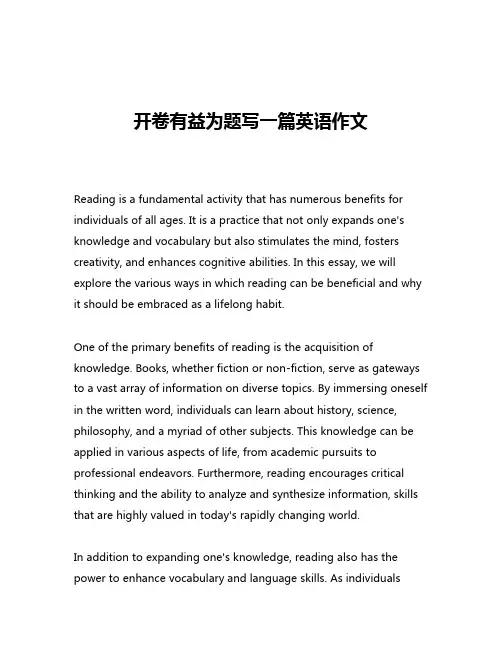
开卷有益为题写一篇英语作文Reading is a fundamental activity that has numerous benefits for individuals of all ages. It is a practice that not only expands one's knowledge and vocabulary but also stimulates the mind, fosters creativity, and enhances cognitive abilities. In this essay, we will explore the various ways in which reading can be beneficial and why it should be embraced as a lifelong habit.One of the primary benefits of reading is the acquisition of knowledge. Books, whether fiction or non-fiction, serve as gateways to a vast array of information on diverse topics. By immersing oneself in the written word, individuals can learn about history, science, philosophy, and a myriad of other subjects. This knowledge can be applied in various aspects of life, from academic pursuits to professional endeavors. Furthermore, reading encourages critical thinking and the ability to analyze and synthesize information, skills that are highly valued in today's rapidly changing world.In addition to expanding one's knowledge, reading also has the power to enhance vocabulary and language skills. As individualsencounter new words and phrases while reading, they are able to expand their lexical repertoire, which in turn improves their ability to communicate effectively. This is particularly beneficial for those learning a new language, as reading provides an opportunity to practice and reinforce the vocabulary and grammatical structures they are learning. Moreover, reading has been shown to improve writing skills, as individuals who read frequently tend to have a better grasp of sentence structure, tone, and style.Another significant benefit of reading is its impact on cognitive development and mental well-being. Studies have shown that reading can improve focus, concentration, and memory. As individuals engage with the written word, they exercise their brain muscles, strengthening their ability to process and retain information. This can have far-reaching implications, from enhancing academic performance to improving decision-making abilities. Furthermore, reading has been linked to a reduction in stress and anxiety, as it provides a peaceful and immersive escape from the demands of daily life.Moreover, reading can foster creativity and imagination. When individuals read fiction, they are transported to different worlds, experiencing the perspectives and narratives of diverse characters. This exposure to new ideas and perspectives can stimulate the mind, inspiring individuals to think outside the box and approach problemsfrom different angles. Additionally, reading can serve as a source of inspiration, sparking the imagination and encouraging individuals to explore their own creative potential.Beyond the individual benefits, reading also has broader societal implications. Literate and well-informed citizens are essential for the functioning of a healthy democracy, as they are better equipped to make informed decisions, engage in critical discourse, and contribute to the betterment of their communities. Reading can also promote empathy and understanding, as individuals are exposed to the experiences and perspectives of others through literature. This can foster a more inclusive and compassionate society, where individuals are more willing to listen, learn, and engage with those who may be different from themselves.In conclusion, reading is a multifaceted activity that offers a wealth of benefits for individuals and society as a whole. From the acquisition of knowledge and the enhancement of language skills to the promotion of cognitive development and mental well-being, reading is a truly remarkable tool for personal growth and enrichment. As such, it is crucial that individuals of all ages and backgrounds embrace reading as a lifelong habit, reaping the countless rewards it has to offer. By cultivating a love for reading, we can unlock the doors to a more informed, creative, and compassionate world.。
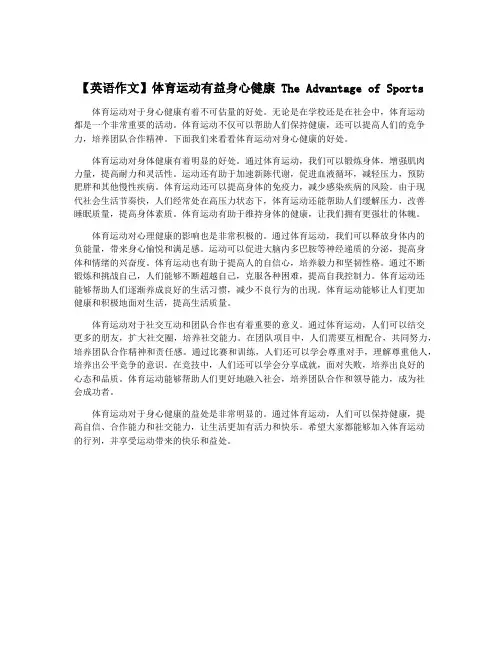
【英语作文】体育运动有益身心健康 The Advantage of Sports体育运动对于身心健康有着不可估量的好处。
无论是在学校还是在社会中,体育运动都是一个非常重要的活动。
体育运动不仅可以帮助人们保持健康,还可以提高人们的竞争力,培养团队合作精神。
下面我们来看看体育运动对身心健康的好处。
体育运动对身体健康有着明显的好处。
通过体育运动,我们可以锻炼身体,增强肌肉力量,提高耐力和灵活性。
运动还有助于加速新陈代谢,促进血液循环,减轻压力,预防肥胖和其他慢性疾病。
体育运动还可以提高身体的免疫力,减少感染疾病的风险。
由于现代社会生活节奏快,人们经常处在高压力状态下,体育运动还能帮助人们缓解压力,改善睡眠质量,提高身体素质。
体育运动有助于维持身体的健康,让我们拥有更强壮的体魄。
体育运动对心理健康的影响也是非常积极的。
通过体育运动,我们可以释放身体内的负能量,带来身心愉悦和满足感。
运动可以促进大脑内多巴胺等神经递质的分泌,提高身体和情绪的兴奋度。
体育运动也有助于提高人的自信心,培养毅力和坚韧性格。
通过不断锻炼和挑战自己,人们能够不断超越自己,克服各种困难,提高自我控制力。
体育运动还能够帮助人们逐渐养成良好的生活习惯,减少不良行为的出现。
体育运动能够让人们更加健康和积极地面对生活,提高生活质量。
体育运动对于社交互动和团队合作也有着重要的意义。
通过体育运动,人们可以结交更多的朋友,扩大社交圈,培养社交能力。
在团队项目中,人们需要互相配合,共同努力,培养团队合作精神和责任感。
通过比赛和训练,人们还可以学会尊重对手,理解尊重他人,培养出公平竞争的意识。
在竞技中,人们还可以学会分享成就,面对失败,培养出良好的心态和品质。
体育运动能够帮助人们更好地融入社会,培养团队合作和领导能力,成为社会成功者。
体育运动对于身心健康的益处是非常明显的。
通过体育运动,人们可以保持健康,提高自信、合作能力和社交能力,让生活更加有活力和快乐。
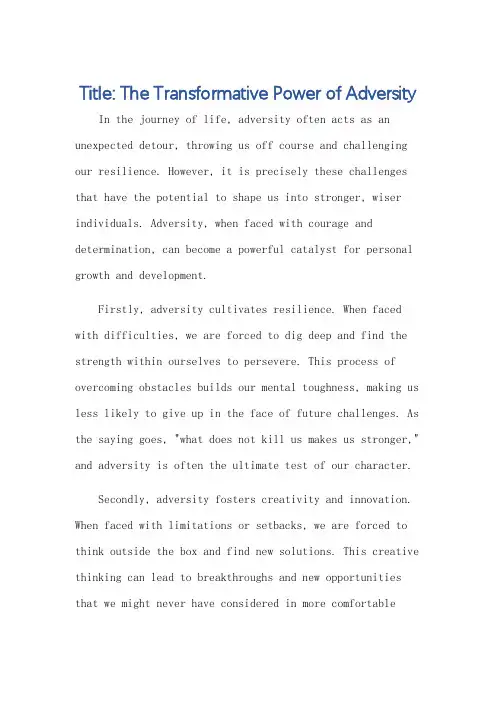
Title: The Transformative Power of Adversity In the journey of life, adversity often acts as an unexpected detour, throwing us off course and challenging our resilience. However, it is precisely these challenges that have the potential to shape us into stronger, wiser individuals. Adversity, when faced with courage and determination, can become a powerful catalyst for personal growth and development.Firstly, adversity cultivates resilience. When faced with difficulties, we are forced to dig deep and find the strength within ourselves to persevere. This process of overcoming obstacles builds our mental toughness, making us less likely to give up in the face of future challenges. As the saying goes, "what does not kill us makes us stronger," and adversity is often the ultimate test of our character. Secondly, adversity fosters creativity and innovation. When faced with limitations or setbacks, we are forced to think outside the box and find new solutions. This creative thinking can lead to breakthroughs and new opportunities that we might never have considered in more comfortablecircumstances. The most innovative ideas often arise from the ashes of adversity.Moreover, adversity helps us to develop a deeper understanding of ourselves. It forces us to reflect on our values, priorities, and goals, often leading to insights and realizations that shape our future path. Through adversity, we learn who we are, what we stand for, and what truly matters in life.Additionally, adversity builds empathy and compassion. When we experience困难, we gain a deeper understanding of the struggles and challenges faced by others. This empathy makes us more compassionate and understanding, helping us to connect with others on a deeper level. Adversity can thus be a powerful tool for fostering unity and understanding in diverse communities.However, it is important to note that not all adversity is beneficial. Prolonged or extreme adversity can have a debilitating effect on individuals, leading to burnout, despair, and even mental illness. It is therefore crucial to find a balance, learning to harness the positive aspectsof adversity while protecting ourselves from itspotentially harmful effects.In conclusion, adversity plays a crucial role in personal growth and development. It cultivates resilience, fosters creativity and innovation, deepens self-understanding, and builds empathy and compassion. While itis important to recognize its potential benefits, we must also be mindful of its potential costs and take steps to protect our well-being. By viewing adversity as an opportunity for growth, we can turn life's challenges into transformative experiences that lead us to become stronger, wiser individuals.**逆境有利于人成长**在人生的旅途中,逆境常常像一个意外的弯道,让我们偏离了原有的轨迹,挑战着我们的韧性。
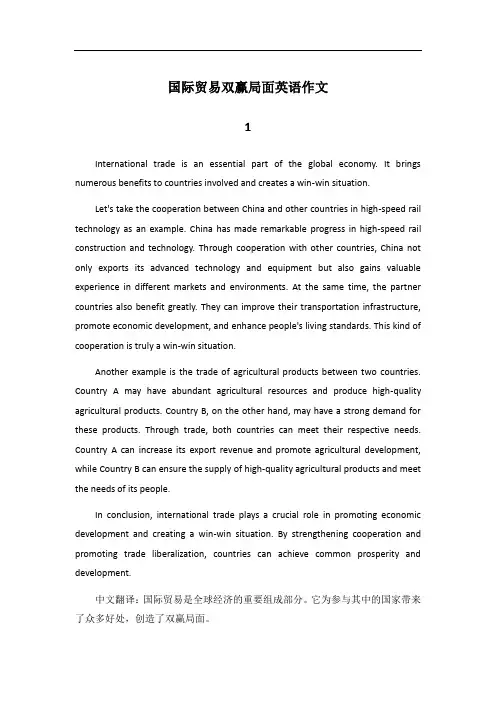
国际贸易双赢局面英语作文1International trade is an essential part of the global economy. It brings numerous benefits to countries involved and creates a win-win situation.Let's take the cooperation between China and other countries in high-speed rail technology as an example. China has made remarkable progress in high-speed rail construction and technology. Through cooperation with other countries, China not only exports its advanced technology and equipment but also gains valuable experience in different markets and environments. At the same time, the partner countries also benefit greatly. They can improve their transportation infrastructure, promote economic development, and enhance people's living standards. This kind of cooperation is truly a win-win situation.Another example is the trade of agricultural products between two countries. Country A may have abundant agricultural resources and produce high-quality agricultural products. Country B, on the other hand, may have a strong demand for these products. Through trade, both countries can meet their respective needs. Country A can increase its export revenue and promote agricultural development, while Country B can ensure the supply of high-quality agricultural products and meet the needs of its people.In conclusion, international trade plays a crucial role in promoting economic development and creating a win-win situation. By strengthening cooperation and promoting trade liberalization, countries can achieve common prosperity and development.中文翻译:国际贸易是全球经济的重要组成部分。
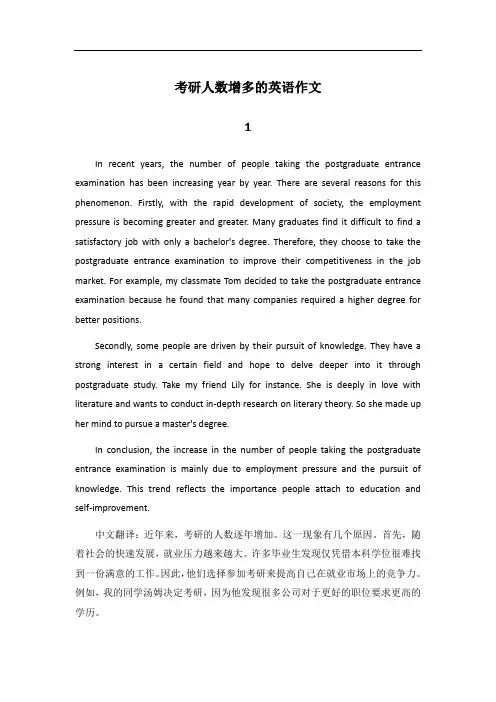
考研人数增多的英语作文1In recent years, the number of people taking the postgraduate entrance examination has been increasing year by year. There are several reasons for this phenomenon. Firstly, with the rapid development of society, the employment pressure is becoming greater and greater. Many graduates find it difficult to find a satisfactory job with only a bachelor's degree. Therefore, they choose to take the postgraduate entrance examination to improve their competitiveness in the job market. For example, my classmate Tom decided to take the postgraduate entrance examination because he found that many companies required a higher degree for better positions.Secondly, some people are driven by their pursuit of knowledge. They have a strong interest in a certain field and hope to delve deeper into it through postgraduate study. Take my friend Lily for instance. She is deeply in love with literature and wants to conduct in-depth research on literary theory. So she made up her mind to pursue a master's degree.In conclusion, the increase in the number of people taking the postgraduate entrance examination is mainly due to employment pressure and the pursuit of knowledge. This trend reflects the importance people attach to education and self-improvement.中文翻译:近年来,考研的人数逐年增加。
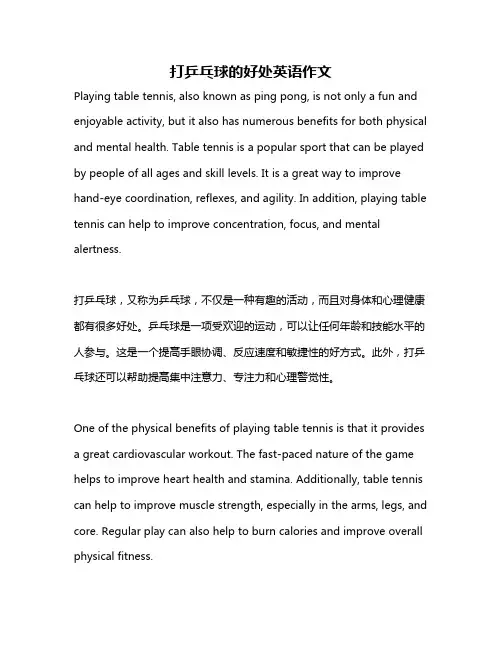
打乒乓球的好处英语作文Playing table tennis, also known as ping pong, is not only a fun and enjoyable activity, but it also has numerous benefits for both physical and mental health. Table tennis is a popular sport that can be played by people of all ages and skill levels. It is a great way to improve hand-eye coordination, reflexes, and agility. In addition, playing table tennis can help to improve concentration, focus, and mental alertness.打乒乓球,又称为乒乓球,不仅是一种有趣的活动,而且对身体和心理健康都有很多好处。
乒乓球是一项受欢迎的运动,可以让任何年龄和技能水平的人参与。
这是一个提高手眼协调、反应速度和敏捷性的好方式。
此外,打乒乓球还可以帮助提高集中注意力、专注力和心理警觉性。
One of the physical benefits of playing table tennis is that it provides a great cardiovascular workout. The fast-paced nature of the game helps to improve heart health and stamina. Additionally, table tennis can help to improve muscle strength, especially in the arms, legs, and core. Regular play can also help to burn calories and improve overall physical fitness.打乒乓球的一个身体益处是可以提供良好的心血管锻炼。
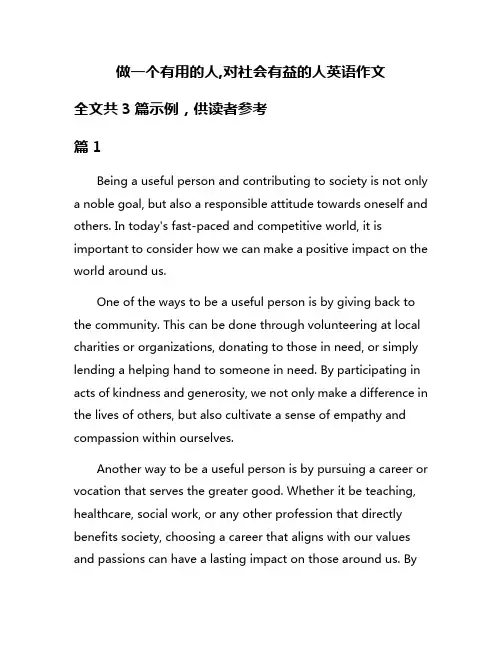
做一个有用的人,对社会有益的人英语作文全文共3篇示例,供读者参考篇1Being a useful person and contributing to society is not only a noble goal, but also a responsible attitude towards oneself and others. In today's fast-paced and competitive world, it is important to consider how we can make a positive impact on the world around us.One of the ways to be a useful person is by giving back to the community. This can be done through volunteering at local charities or organizations, donating to those in need, or simply lending a helping hand to someone in need. By participating in acts of kindness and generosity, we not only make a difference in the lives of others, but also cultivate a sense of empathy and compassion within ourselves.Another way to be a useful person is by pursuing a career or vocation that serves the greater good. Whether it be teaching, healthcare, social work, or any other profession that directly benefits society, choosing a career that aligns with our values and passions can have a lasting impact on those around us. Byusing our skills and talents to address pressing social issues and improve the lives of others, we can make a meaningful contribution to the world.Furthermore, being a useful person also involves being a responsible and conscientious citizen. This means following laws and regulations, respecting others, and taking care of the environment. By being mindful of our actions and their potential consequences, we can help create a safer and more harmonious society for everyone.In conclusion, being a useful person and contributing to society is a multifaceted endeavor that requires both individual initiative and collective effort. By actively seeking ways to give back, pursuing a career that serves the greater good, and being a responsible citizen, we can all play a role in making the world a better place. Let us strive to be useful people who leave a positive impact on the world around us.篇2Being a useful person and benefiting society are important values that can have a positive impact on the world around us. By actively contributing to society and making a difference in the lives of others, we can create a better and more prosperouscommunity for everyone. In this essay, we will discuss the significance of being a useful person and how it can benefit society.To begin with, being a useful person means using one's skills, knowledge, and resources to help others in need. This could involve volunteering, donating to charitable causes, or simply offering a helping hand to those around us. By being a useful person, we can make a tangible difference in the lives of others and bring about positive change in the world.One of the key benefits of being a useful person is that it fosters a sense of community and solidarity among people. When we work together to support those in need, we create a sense of unity and connection that can strengthen social bonds and bring people closer together. By being a useful person, we can build a more compassionate and caring society where everyone is willing to lend a hand to those in need.Furthermore, being a useful person can also have a positive impact on our own well-being and sense of fulfillment. When we engage in acts of kindness and generosity, we experience a sense of purpose and satisfaction that comes from knowing that we are making a difference in the world. By being a useful person,we can enhance our own happiness and sense of fulfillment, leading to a more meaningful and rewarding life.In addition, being a useful person can have wide-reaching benefits for society as a whole. By coming together to address pressing social issues and support those in need, we can create a more just and equitable society where everyone has the opportunity to thrive. By being a useful person, we can contribute to the overall well-being and prosperity of our community, making it a better place for everyone.In conclusion, being a useful person and benefiting society are important values that can have a positive impact on the world around us. By actively contributing to society and making a difference in the lives of others, we can create a better and more prosperous community for everyone. Let us all strive to be useful people who work towards the betterment of society and make the world a brighter and more compassionate place for all.篇3Being a person of value, being beneficial to society is a goal that many people strive to achieve. It is important for individuals to contribute positively to the world around them and make a difference in the lives of others. In this essay, I will discuss theimportance of being a useful person and how one can make a positive impact on society.First and foremost, being a useful person means that one is able to contribute to the well-being of others. This can be done through various means, such as volunteering, charity work, or simply being there for someone in need. By helping others and making a difference in their lives, one can truly become a valuable member of society.In addition, being a useful person also involves making a positive impact on the environment and the world at large. This can be achieved through sustainable practices, such as recycling, reducing waste, and conserving energy. By taking care of our planet and being mindful of our impact on the environment, we can ensure a better future for generations to come.Furthermore, being a useful person also entails being a good role model for others. By setting a positive example through our actions and behavior, we can inspire those around us to strive for greatness and make a difference in the world. Whether it is through our work ethic, our compassion, or our dedication to a cause, we can show others that it is possible to be a force for good in the world.In conclusion, being a useful person and making a positive impact on society is a noble goal that we should all strive for. By helping others, taking care of the environment, and being a good role model, we can truly make a difference in the world and leave a lasting legacy. Let us all work towards being valuable members of society and making the world a better place for future generations.。
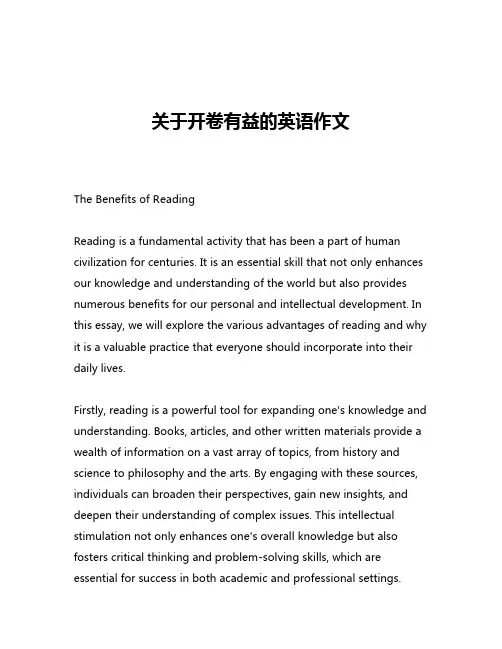
关于开卷有益的英语作文The Benefits of ReadingReading is a fundamental activity that has been a part of human civilization for centuries. It is an essential skill that not only enhances our knowledge and understanding of the world but also provides numerous benefits for our personal and intellectual development. In this essay, we will explore the various advantages of reading and why it is a valuable practice that everyone should incorporate into their daily lives.Firstly, reading is a powerful tool for expanding one's knowledge and understanding. Books, articles, and other written materials provide a wealth of information on a vast array of topics, from history and science to philosophy and the arts. By engaging with these sources, individuals can broaden their perspectives, gain new insights, and deepen their understanding of complex issues. This intellectual stimulation not only enhances one's overall knowledge but also fosters critical thinking and problem-solving skills, which are essential for success in both academic and professional settings.Moreover, reading has a profound impact on cognitive development. Studies have shown that reading regularly can improve memory, concentration, and analytical skills. As individuals engage with written content, they are required to process and retain information, which strengthens their cognitive abilities. Additionally, reading has been linked to improved language skills, as individuals are exposed to a diverse vocabulary and various writing styles, which can enhance their own communication abilities.Another significant benefit of reading is its ability to improve mental well-being. Reading has been shown to reduce stress and anxiety by providing a means of escape and relaxation. When individuals immerse themselves in a book, they can temporarily disconnect from the stresses of daily life and enter a state of mindfulness and calm. This can have a profound impact on an individual's overall mental health, as it can alleviate symptoms of depression, anxiety, and other mental health issues.Furthermore, reading can foster personal growth and self-discovery. Through the stories and perspectives presented in books, individuals can gain a deeper understanding of themselves and the human experience. This can lead to a greater sense of empathy, as readers are exposed to diverse experiences and perspectives that may differ from their own. Additionally, reading can inspire personal reflectionand introspection, which can help individuals develop a stronger sense of self and a clearer understanding of their values, beliefs, and aspirations.Another significant benefit of reading is its ability to enhance creativity and imagination. When individuals engage with written content, they are required to visualize the scenes, characters, and events described, which can stimulate their imagination and spark new ideas. This can be particularly beneficial for individuals in creative fields, as reading can serve as a source of inspiration and fuel for their own creative endeavors.In addition to the cognitive and personal benefits, reading can also have a positive impact on one's social and professional life. By engaging with written content, individuals can develop a broader understanding of different cultures, societies, and perspectives, which can enhance their ability to communicate and collaborate effectively with others. This can be particularly valuable in professional settings, where the ability to navigate diverse perspectives and communicate effectively is essential for success.Moreover, reading can serve as a gateway to lifelong learning and personal growth. As individuals continue to read and engage with new sources of information, they can maintain a sense of curiosity and a desire to learn, which can lead to a more fulfilling andenriching life. This can be particularly valuable in today's rapidly changing world, where the ability to adapt and learn new skills is essential for success.In conclusion, the benefits of reading are numerous and far-reaching. From enhancing cognitive abilities and mental well-being to fostering personal growth and social development, reading is a valuable practice that everyone should incorporate into their daily lives. Whether it is reading for pleasure, learning, or personal development, the act of engaging with written content can have a profound impact on an individual's overall well-being and success. As such, it is essential that individuals of all ages and backgrounds make reading a priority and take advantage of the numerous benefits it has to offer.。
经济增长的益处In today's interconnected world, economic growth has become a pivotal aspect of societal progress and development. Its benefits are diverse and far-reaching, impacting individuals, communities, and nations alike. This essay delves into the numerous advantages of economic growth, discussing its role in enhancing living standards, promoting innovation, and fostering global stability.Firstly, economic growth is a key driver of improved living standards. As economies expand, they generate more jobs and higher wages, leading to increased disposable income for households. This, in turn, translates intobetter access to education, healthcare, and other essential services. For instance, in many developing countries, economic growth has lifted millions out of poverty,providing them with basic necessities and a chance to enjoy a more fulfilling life.Secondly, economic growth fosters innovation and technological advancement. As businesses expand and compete, they invest in research and development, leading to the creation of new products, services, and processes. Theseinnovations not only improve productivity but also create new industries and sectors, driving further economic growth. For instance, the rise of the internet and digital technologies has revolutionized the way we live, work, and communicate, spurring significant economic growth in the process.Moreover, economic growth is essential for global stability. Strong economies are more resilient to external shocks and crises, enabling them to weather difficult times without collapsing. This stability is not only beneficialfor the economy itself but also for the international community, as it prevents the spread of economic and social unrest. Additionally, economic growth can lead to increased international cooperation and integration, fostering a more interconnected and peaceful world.However, it is important to note that economic growth must be sustainable and inclusive to ensure its benefitsare widely shared. Growth that comes at the cost of environmental degradation or social inequality is not sustainable in the long run. Therefore, policies and strategies that promote sustainable and inclusive growthmust be prioritized to ensure that the benefits of economic growth are enjoyed by all.In conclusion, economic growth is a crucial driver of societal progress and development. It improves living standards, fosters innovation, and enhances global stability. However, to ensure its long-term sustainability and widespread benefits, a focus on sustainable and inclusive growth is paramount. By investing in education, infrastructure, and innovation while prioritizing environmental protection and social equality, we can harness the full potential of economic growth to create a more prosperous and harmonious world.**经济增长的益处**在当今相互联系的世界中,经济增长已成为社会进步和发展的关键方面。
考试有害还是有益英语作文Exams have always been a topic of debate in the education system. Some people argue that exams are harmful as they can lead to stress, anxiety, and pressure on students. They believe that exams focus on memorization rather than understanding, and that they do not accurately measure a student's true abilities.On the other hand, exams can also be viewed as beneficial. Exams provide a structured way to assess a student's knowledge and understanding of a subject. They can motivate students to study and prepare for the test, leading to better retention of information. Exams also help teachers and parents to gauge a student's progress and identify areas where they may need additional support.In my opinion, exams can be both harmful and beneficial, depending on how they are conducted and the emphasis placed on them. While exams can be a source of stress, they can also serve as a valuable tool for assessing a student's academic performance and understanding of the material. It is important for educators to strike a balance between using exams as an assessment tool and ensuring that they do not overshadow the overall learning experience.中文翻译:考试一直是教育体系中的一个争论话题。
谈论大学生兼职有利英语作文Having a part-time job as a college student can be beneficial in many ways. It not only provides extra income but also valuable work experience. 大学生兼职不仅可以提供额外的收入,还可以获得宝贵的工作经验。
Working part-time allows students to develop essential skills such as time management, communication, and teamwork. These skills are crucial for future career success. 兼职工作使学生能够培养时间管理、沟通和团队合作等重要技能,这些技能对未来职业成功至关重要。
Furthermore, part-time jobs can help students to network and make connections that could lead to future career opportunities. 除此之外,兼职工作还可以帮助学生建立人际关系,为未来的职业机会做好准备。
Having a part-time job can also teach college students the value of hard work and responsibility. It instills a strong work ethic that can benefit them in their academic and professional pursuits. 兼职工作也可以教会大学生努力工作和责任感的价值,树立一个强烈的职业道德观,可以让他们在学术和职业生涯中受益。
——文章来源网,仅供分享学习参考
~ 1 ~
关于竞争是有益的
比赛就像是火箭的燃料。如果没有它,我们不能取得进展。如果没有
它,我们不会采取在尽一切努力。竞争是我们日常生活的推进器。由
于它,我们必须尽我们所能,做一些事情,否则我们会落后。因此,
竞争是有益的。
这就是为什么社会正在迅速取得进展。整个社会是一个竞争,而所
有社会成员的竞争对手。一个人谁想要得到一份好工作,必须比别人
做得更好。如果不是,他会被淘汰。这是有关工作做得更好,更好的
理由。比赛传遍我们的日常生活。作为一名学生,我们必须尽我们所
能,研究,才能有光明的前途。作为该公司的雇主,我们必须对我们
最大的能力。如果没有,我们可能会落后或失去工作。虽然我们可能
会失去在竞争中遭遇,我们可以看成是一个挑战失败。从此,我们可
以得到更多的经验,这将是取得成功的关键。因此,竞争是有益的。
竞争可以激励所有的竞争对手。从比赛中,我们可以得到的经验,
无论结果如何是输或赢。